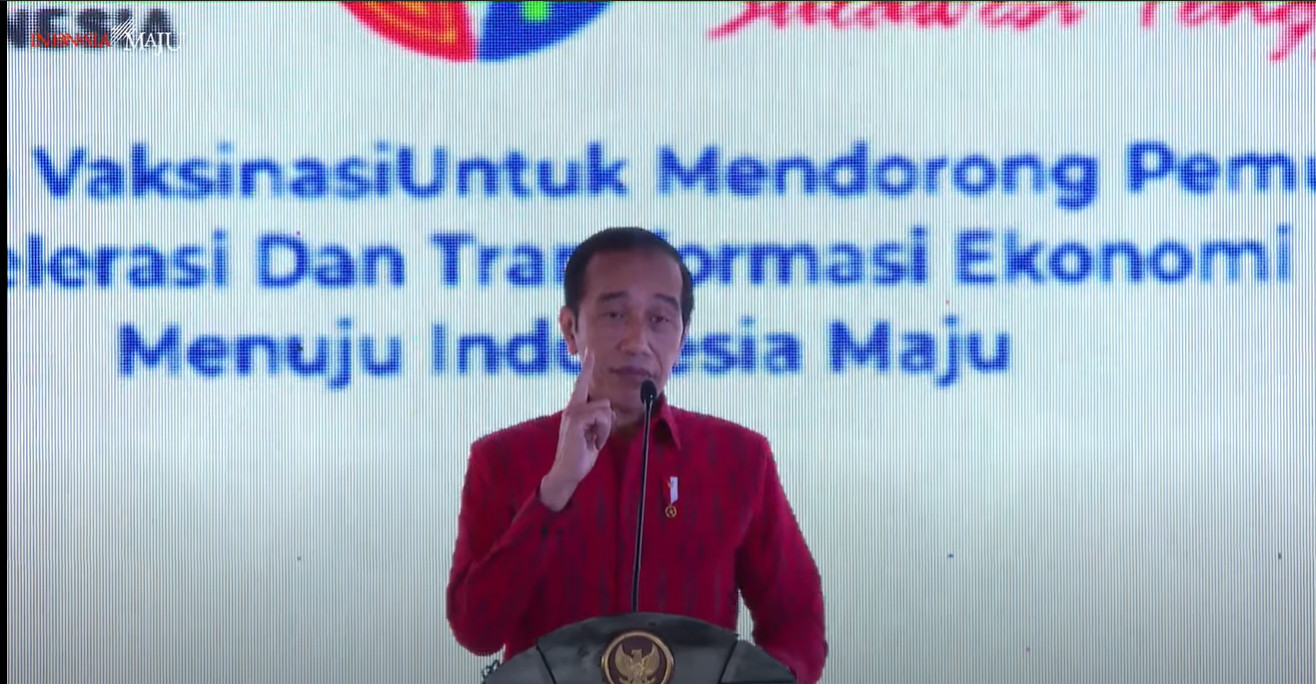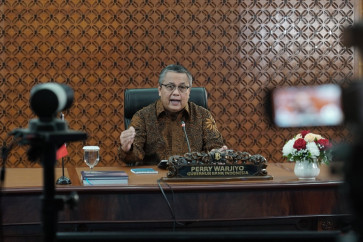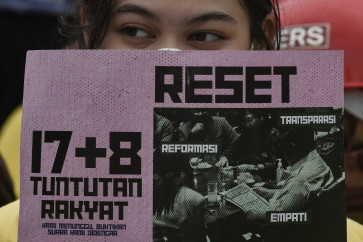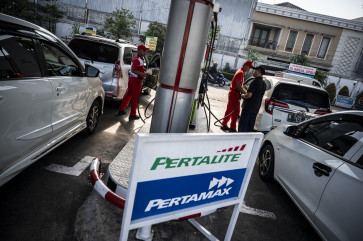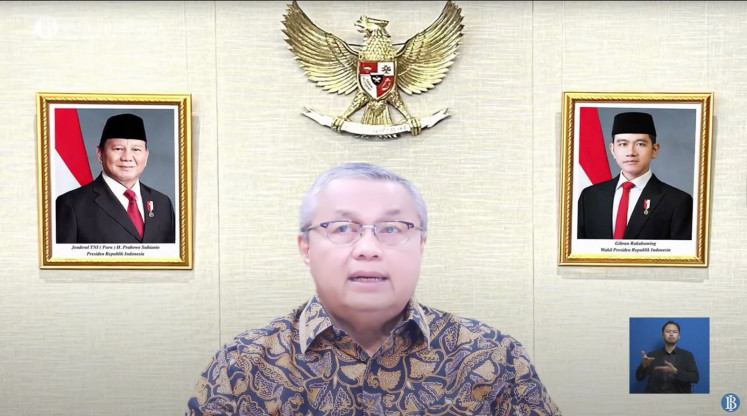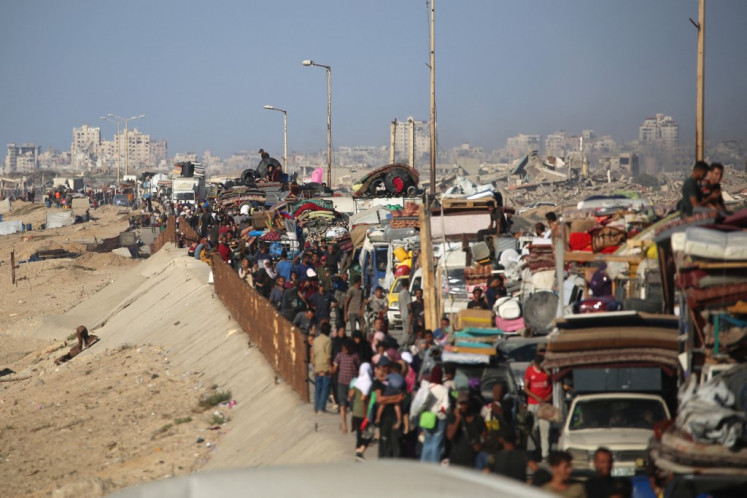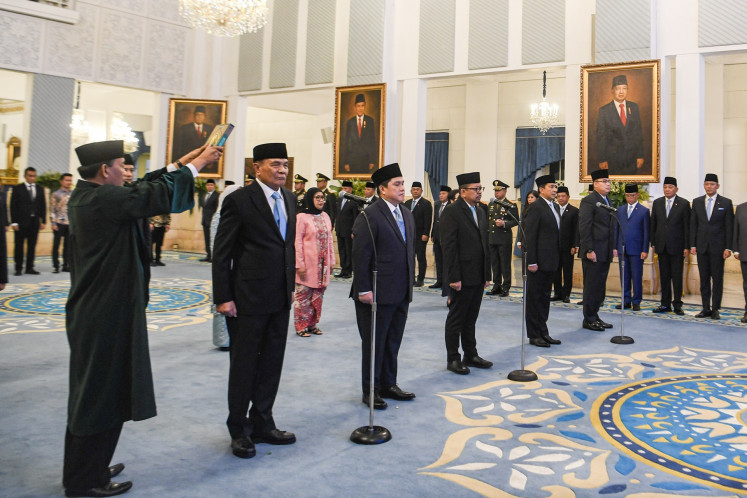Popular Reads
Top Results
Can't find what you're looking for?
View all search resultsPopular Reads
Top Results
Can't find what you're looking for?
View all search resultsJava, Bali brace for emergency lockdown
Jokowi instructs Luhut Pandjaitan to oversee proposed restrictions
Change text size
Gift Premium Articles
to Anyone
I
ndonesia’s most populated and popular islands are bracing for stricter lockdown measures this week, with President Joko “Jokowi” Widodo touting the inevitability of shifting policy amid soaring COVID-19 cases.
The country recorded another record-breaking day with 21,807 new COVID-19 cases and 467 deaths, according to official figures published on Wednesday. The numbers are widely regarded as conservative estimates because of severely inadequate testing outside Jakarta.
The Health Ministry also reported alarming bed occupancy rates (BORs) in Jakarta, Banten and West Java – all of which have surpassed 90 percent – followed by Yogyakarta and Central Java at 89 and 87 percent, respectively.
Speaking at an industry event in Kendari, Southeast Sulawesi, Jokowi revealed that new restrictions could be imposed on Java and Bali soon, singling out in particular the 44 regencies and cities and six provinces across Java that have a high risk of community transmission.
He refused, however, to disclose details of the new plan, including the timeline of the new restrictions, saying only that Coordinating Economic Affairs Minister Airlangga Hartarto, who also helms the national COVID-19 and economic recovery committee (KPC-PEN), is expected to make the final decision.
“Today [the government] will finalize our review [...] about imposing the PPKM Darurat [emergency restrictions], which we hope to conclude soon,” Jokowi said at the national congress of the Indonesian Chamber of Commerce and Industry (Kadin) on Wednesday morning.
At the time of writing, there were two different proposal options for the emergency restriction measures.
In a presentation dated June 28, Airlangga’s KPC-PEN suggested introducing emergency micro-scale public activity restrictions (PPKM Mikro Darurat).
The proposal, which has been widely reported in the media, would allow regencies in designated COVID-19 red and orange zones to continue work-from-office limitations at 25 percent capacity, while essential services would be allowed to continue functioning at 100 percent capacity. Restaurants and shopping centers would be allowed to remain open at 25 percent capacity but must closing at 5 p.m.
The secretary to the coordinating economic minister, Susiwijono Moegiarso, did not confirm the veracity of the document, but pointed to Jokowi’s speech in Kendari.
As word of the plan circulated on Tuesday, a spokesman for the Office of the Coordinating Maritime Affairs and Investment Minister confirmed the existence of another proposal, after revealing that the President had appointed close aide Luhut Pandjaitan to lead the stricter lockdown measures for Java and Bali.
Luhut has proposed even stricter lockdown measures than Airlangga’s proposal, including requiring all nonessential workers and school students to work and study from home, while essential workers continue to work from the office but at 50 percent of the maximum office capacity.
These recommendations were laid out in a presentation dated June 30, which office spokesman Jodi Mahardi confirmed.
Under this proposal, shopping centers, places of worship and public facilities will be closed while restaurants will only be allowed to offer a takeaway service. Public transportation will run at 70 percent capacity, while long distance travelers or passengers on airplanes, buses and trains must present proof that they have received at least one dose of the COVID-19 vaccine and polymerase chain reaction (PCR) test results taken in the previous two days.
Jodi stressed, however, that these recommendations were still not final. “It will depend on the President's decision,” Jodi told The Jakarta Post in a short message on Wednesday afternoon.
According to various sources, the government is to announce the final decision on stricter curbs on Thursday.
Regardless of which plan Jokowi chooses, most regional administrations in Java said they would welcome a stricter policy to curb the spread of COVID-19, although others still held some reservations.
Central Java Governor Ganjar Pranowo said that he had issued an instruction to impose stricter measures that were in line with the central government's policy.
Yogyakarta Governor Hamengkubuwono meanwhile called for more holistic measures, saying that closing one kind of gathering place such as shopping malls “would only direct crowds elsewhere”, kompas.com quoted administration spokesman Nanaryo Aji as saying.
West Java Governor Ridwan Kamil, on the other hand, argued that a province-wide lockdown would be “useless” if neighboring Banten, Jakarta and Central Java did not participate.
On top of that, the administration would have to foot the bill to provide for the daily needs of residents in 731 neighborhood units (RT) and conduct tracing and rounds of area disinfections. One estimate placed the cost of such strict lockdown measures for one RT at Rp 3.5 million.
“If all of West Java goes into lockdown, we’ll need Rp 900 billion each day,” Ridwan said.
Meanwhile, the Indonesian Retailers Association (Aprindo) has decried the government’s proposed measures for further limiting the operational hours of malls, suggesting that such curbs would likely be “ineffective” but still have far-reaching impacts. He demanded that the state thoroughly assess the impacts of its plan.
“Limiting the operational hours [of retail spaces] will potentially create crowding at certain hours and cause harm to micro, small and medium enterprises, slowing down the food and beverages sector and potentially driving more retailers into the ground,” Aprindo chairman Roy Mandey said in a statement on Wednesday.
Epidemiologists say, however, that stricter measures are long overdue considering the current curb regime has proven inadequate amid soaring cases across Java.
“We need to enact stricter curbs because we can’t locate and separate those who are infected from the general public fast enough to counter the spread [of COVID-19],” Gadjah Mada University epidemiologist Riris Andono Ahmad told the Post on Wednesday.
– Suherdjoko from Semarang, Central Java and Adi Marsiela from Bandung, West Java contributed to the story.

